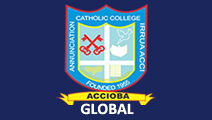History of ACCI
History of Annunciation Catholic College Irrua Old Boys Association
Annunciation Catholic College, Irrua, the first secondary school in Esan land was established in 1955 when the defunct Benin province was a part of the defunct Western region of Nigeria that had its Capital at Ibadan. Therefore, when one understands that the approval to establish Annunciation Catholic College, Irrua was granted by the Ministry of Education western region with Ibadan as the seat of Government, then one will begin to appreciate the efforts of the founding fathers of the college. It took tireless efforts and extra determination to shuttle between Benin and Ibadan in a volks wagon car or motorcycle to ensure that the powers that be approved the establishment of the college. The realization of this fact must also have made the founding principal very determined that he left lasting legacy by the high standard on which he set the college right from the start.
The history of Annunciation Catholic College Irrua therefore is the history to a large extent or the development of education in Esan land. Its establishment opened the way for the establishments of Esan Grammar School, Uromi. Anglican Grammar School Ekpoma and pilgrim Baptist Grammar School, Ewohimi within the decade 1955 to 1965. Annunciation catholic College Irrua is therefore the father of all the Secondary Schools in Esan land. Most of the early products of school were employed as the early teachers in the other Schools that were established in Esan land. Thus Esan land benefited from the experiences gained by Ojefua from Saint Patrick’s College Asaba.
ANNUNCIATION CATHOLIC COLLEGE, Irrua (1955)
In the days of yore secondary schools owned by the colonial administration were few. Thus the missions participated actively in the establishment and administration of more schools to meet the expanding educational desires of parents and their wards. In 1954 Bishop Patrick Kelly, who was in charge of Benin Ecclesiastical diocese got approval to establish a secondary school in Esan land. He naturally chose reverend father Anselm Isidahome Oefua, who was then highly educated and had gained valuable and extensive experience in school administration at Saint Patrick’s college, Asaba for the new experiment as it were.
Thus in 1955, Reverend father Anslem Isidahome Ojefua moved to Irrua to face the new challenge of establishing a college. There were no structures on ground and the assignment was urgent. On arrival at Irrua, Reverend Father Anslem Isidahome Ojefua consulted widely with prominent persons at Irrua including the Onojie. Dr Christopher Okojie, Chief Odiase, Prince Shaka Momodu and others. At the end of the consultations, a large parcel of virgin land was secure for the college. However prior to working at the site, the Reverend Father negotiated for and secures a temporary place at the private resident of Prince Shaka Momodu where he started the school opposite Zuma Memorial Hospital, Irrua.
All the students numbering 30 and the founder- principal lived in this temporary site. During the first year, the nearby primary school, Saint Paul Catholic Primary School Akho became useful. The school hall served as venue for mass while the field was used for sporting activities. Also, the first tutor Mr Obaitan, who had just completed his first degree e course in December 1954, also lived in the school premises. Shortly after, Mr. Obaitan left the college temporarily and Mr Olisa replaced him. During the first year also, the Diocesan building contractor who was Reverend Father Fagan intensified the construction work at the school permanent site.
By 1958, with a crop of highly dedicated and energetic staff which include tutors like Mr .P. Agokie, Mr .E.U. Okwechime, Mr .D. Ataga and the college clerk, Mr .P. Ada. Omorogiuwa, it became necessary to start thinking seriously about turning out the first products of the college. Even by the end of the third year, it was not certain whether the first set would be spending 6 years as was common then with the most new schools since no much teaching and learning usually took place in the first year. During this period of uncertainty and anxiety, and pioneer and a brilliant student from Asaba, Robert Nwanze went on holidays and never came back to the college. This behavior caused us, his classmate, Mora anxiety and Fr. Ojefua, anger. He responded by sending all the students of asaba origin home. It took the intervention of all the parents of the students concerned to get back to the college we later learnt that Robert Nwanze went too resumed in an older college and might not have benefited from the abrupt change he made.
With the final examination over at the end of 1959, parting came with many of us not certain of what we were going to do thenceforth. I was lucky to be retained in the college as a tutor. It was the time in this part of the country when career guidance was non-existence and opportunities were very low. Nevertheless, the great spirit of hard work, resourcefulness, initiative and good leadership inculcated in us by the grate man, Rev Ojefua and the motto of our Alma Mater: “Recta discere et facere” (when we know what is right, we should endeavor to do it perfectly) propelled us on.
Don’t Miss Awesome Story From Our Alumni
Duis autem vel eum iriure dolor in hendrerit in vulputate.
